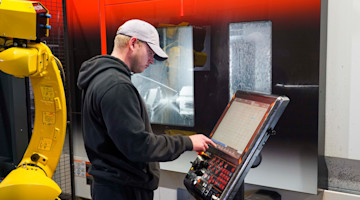The CDFAM 2023 symposium held in New York City served as a platform for leaders in computational design to delve into the latest trends and practices in design, engineering, and advanced manufacturing. Traditional design processes involve manual iterations starting from a predefined concept; computational design modernizes this approach by using algorithms and software tools to automate and enhance design exploration and optimization. This modern approach addresses critical scalability and applicability challenges when complex and diverse part design tasks are attempted. The result is the next generation of design experiences and productivity.
Companies such as Twikit, Mode Lab, and Synera are driving innovation in computational design and providing new opportunities for businesses to grow with faster, cost-effective, and even superior design processes. The integration of computational design into the product development process not only renders the design process synonymous with innovation but also emphasizes the importance of optimizing new product introduction in ways that align with the specific needs and objectives of businesses and their product portfolios.
One solution to customer traction as a consumer-facing product company is mass customization, where customers seek ever more personalized products that give a sense of participation, agency, and ownership. Twikit, a Belgium-based design software company, introduced its scalable design solution called Twikbot at the CDFAM event, intent on simplifying the integration of product mass customization into any design process. The Twikbot platform allows businesses and customers to input design specifications and preferences, which are then seamlessly integrated into the production workflow enabling end-to-end design automation. The active involvement of both designers and customers accelerates customization while reducing design time for engineers. With the automation of repetitive design tasks, design optimization, and consideration for manufacturability constraints, Twikbot's product customization capabilities are a path to improve customer demand and satisfaction for consumer-facing products.
Another player in the field, Mode Lab, addresses the challenges of scalability and applicability through its comprehensive design pattern library. This curated collection of design patterns, components, and guidelines provides engineers with a resource that promotes reusability and standardization, automates repetitive tasks, and supports continuous improvement. By leveraging pre-designed components, product designers save considerable time and effort while ensuring consistency and adherence to guidelines. Collaborative interactions within the pattern library foster creativity and knowledge exchange, while integrated design validation tools minimize errors and reduce design iterations. The design pattern library can be consistently updated with the latest advancements, which fosters an environment conducive to continuous improvement. Ultimately, these factors contribute to the generation of high-quality designs, faster design cycles, and cost-effective outcomes.
In the context of scaling and accelerating product development, the traditional product design process is known for its time-consuming nature, which poses a challenge as products need to reach today’s market faster and faster. To meet this challenge, Synera offers a solution through its low code platform, aiming to transition from document-based engineering to model-based engineering, thereby instilling agility into the product development process. Model-based engineering provides numerous benefits over document-based engineering, including clearer and visually appealing representations of systems, improved collaboration and communication among designers, and early issue detection. The low-code approach not only simplifies the design process but also facilitates the smooth onboarding of individuals with limited design skills. These collective advantages increase understanding, reduce errors, improve design quality, and boost overall design process efficiency, which all help companies keep pace with new product introductions.
The symposium brought together industry leaders that showcased the transformative potential of computational design and mass customization in the design, engineering, and advanced manufacturing fields. Companies like Twikit, Mode Lab, and Synera offer examples of scalable design solutions that can empower businesses to achieve better, faster, and more cost-effective design processes. To meet the evolving market demands and increase customer satisfaction, product companies should consider using modern design software tools such as Twikbot, design pattern libraries, and model-based engineering. Companies today can choose from an increasing range of tools to design the next generation of custom products; these tools enable companies to stay ahead and keep their products aligned with ever-growing customer needs.
Shape the future of industrial 3D printing Join the conversation at Formnext Forum Austin, August 28-30, in Austin, Texas. Industrial AM innovation is the focus of the event, which is designed for industrial business leaders who want to further expand AM into their operations, as well as for those who want to evaluate AM as a production technology. It is also a place where engineers, researchers, and those who develop and apply AM technologies can exchange ideas that spur further innovations.
Register for Formnext Forum Austin to learn more at formnextforum.com. Use the discount code: FFAIMTS.






